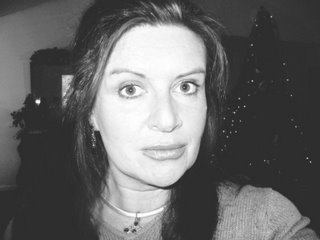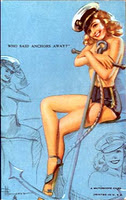Rocky Mountain News reporter Lou Kilzer has penned an article which practically nominates persons with autism as those Most likely to become serial killers. My letter of outrage is copied below:
Dear Mr. Kilzer,
I am deeply troubled by your report of 7/28/2006, "Piecing Together Serial Killer Puzzles Psychiatrists..."
Imagine how surprised I was to learn that I might be the mother of two ax murders in the making!
I fear that in your eagerness to brand persons with autism as potential serial killers, you have neglected to read the supporting body of work by J. Arturo Silva and colleagues, which is related to the study cited in your article. If you had read the body of work, you would find that Silva's work SUGGESTS that SOME serial killers exhibit *evidence* of Asperger's Disorder, which is a *variant* of autism.
Closer inspection of Silva's work reveals that his findings are based on historical case studies and interviews taken with parents and relatives of a serial killers, many years after the fact. None of these fifty serial killers cited by Silva were ever actually *diagnosed* with autism spectrum disorders during childhood.
Instead, the study's authors used compiled developmental histories, based on ex-post facto interviews, to find that during childhood, a few serial killers were reported to have exhibited *some* features consistent with a diagnosis of an autism spectrum disorder.
Silva uses these *retroactive* case studies to support his characterization of a subset of serial killers as having a rare *variant* of Asperger's Disorder or High Functioning Autism. He hopes his work "could lead us to a greater understanding of the etiology of both serial homicide and autism."
Previous work by Silva found that persons with autism only showed, by his statistics, a mere 1 to 3 percent increased risk to commit murder when compared to the general population.
Again, you painfully misinterpreted Silva's work when you correlated a sensationalistic lead sentence with with a statistically signifcant common thread between serial killers--Autistic tendencies.
Throughout the article, you nudged readers towards the inevitable conclusion that people with autism are unfeeling sexual perverts lying in wait for their next murder victim.
What you did not say is every bit as important as what you did choose to report.
Never did you make it clear to readers that sexual violence, criminal fantasy and perversion are not diagnostic features of autism spectrum disorders. Even Silva states in previous studies and commentaries that only a subset of these serial killers *may* have been children with autism or borderline autism.
The *fact* is that persons with autism have a much higher (in excess of a ninety-percent) probability of falling victim to physical and sexual abuse when compared to persons without autism.
Whether serial killers actually suffered from autism as children is likely impossible to prove. But serial killers do share one thing in common with many persons who have autism. Serial killers were often themselves victims of childhood bullying, childhood abuse and/or sexual abuse.
What you did not say is every bit as important as what you did choose to report.
Never did you make it clear to readers that sexual violence, criminal fantasy and perversion are not diagnostic features of autism spectrum disorders. Even Silva states in previous studies and commentaries that only a subset of these serial killers *may* have been children with autism or borderline autism.
The *fact* is that persons with autism have a much higher (in excess of a ninety-percent) probability of falling victim to physical and sexual abuse when compared to persons without autism.
Whether serial killers actually suffered from autism as children is likely impossible to prove. But serial killers do share one thing in common with many persons who have autism. Serial killers were often themselves victims of childhood bullying, childhood abuse and/or sexual abuse.
If serial killers, as children, appeared to show retrospective autistic tendencies, is it any surprise that their propensity for murderous violence was more a symptom of nurture than nature?
By failing to explain to your readers that sexual violence, perversion, and hatred of women is not part of the diagnostic criteria for autism, your report is written in such a way that your readership will conclude that all people with autism are likely to kill, rape, dismember, and maim.
Ignorance is a far cry from bliss, Mr. Kilzer. With your irresponsible pen, you have sent autism awareness careening back into the dark ages. Fueling further justification for the acts of hatred towards persons with autism with your inadequate reporting is beyond reprehensible.
I suggest that the next time you attempt to report on a study correlating serial killers with autism, you bother to actually read the source material first. Then I suggest you bother to familiarize yourself with the DSM IV standard criteria for the diagnosis of autism spectrum disorder. (299)
Or, if you truly want to change the world for the better--resign.
By failing to explain to your readers that sexual violence, perversion, and hatred of women is not part of the diagnostic criteria for autism, your report is written in such a way that your readership will conclude that all people with autism are likely to kill, rape, dismember, and maim.
Ignorance is a far cry from bliss, Mr. Kilzer. With your irresponsible pen, you have sent autism awareness careening back into the dark ages. Fueling further justification for the acts of hatred towards persons with autism with your inadequate reporting is beyond reprehensible.
I suggest that the next time you attempt to report on a study correlating serial killers with autism, you bother to actually read the source material first. Then I suggest you bother to familiarize yourself with the DSM IV standard criteria for the diagnosis of autism spectrum disorder. (299)
Or, if you truly want to change the world for the better--resign.



